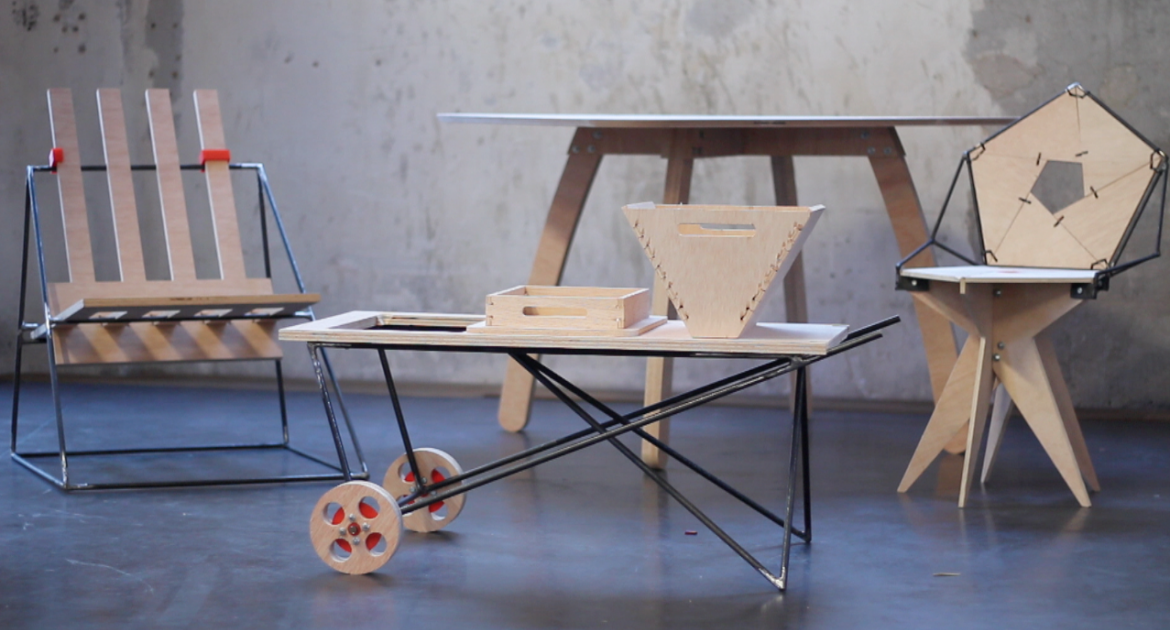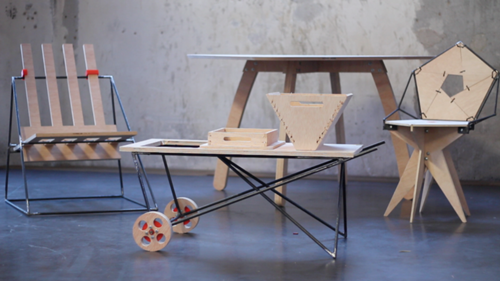BUILD, SHARE, INHABIT

> Groups and projects
> Events calendar
> Furniture projects
> Indoor gardens
> Foodlab projects

Since Medialab-Prado first took up residence in the old Serrería Belga (The Belgian Sawmill) building in April 2013, various activities have been underway to fit out the new spaces. Workshops open to user participation have led to the construction of furniture, indoor gardens and new tools to make Medialab-Prado a liveable space, ideal for gatherings, group experimentation and shared learning.
The furniture was built using machinery belonging to the Medialab-Prado Fab Lab, a workshop with 3D printers, a laser cutter and a CNC router. These digital tools hark back to the chainsaws used at the old sawmill, two of which remain intact, and underline the productive and experimental nature of Medialab-Prado.
The workshops have enjoyed the collaboration of groups and users, who have documented their designs and work processes so the projects can be replicated in other parts of the world.
'Build, share, inhabit' is a portfolio of projects and program of activities that includes debates, production workshops and guided tours of the Medialab-Prado building.
Groups and projects
PKMN
ZULOARK
RADARQ
MAKEA TU VIDA
BASURAMA
RE:FARM THE CITY
FABLOOM MADRID-LIMA
SERRERÍA SOBRIA / SERRERÍA EXTRAVAGANTE (MANUFACTURA INDEPENDIENTE)
OPERACIÓN HERMINIO
MAKE A SITY
FABLAB MEDIALAB-PRADO
JULIEN DESWAEF (UHBENCH)
I+PAPEL
OPEN SOURCE ACOUSTICS
COLMENAS URBANAS
CULTIVO ACUAPÓNICO
STREET FOOD (PEZ ESTUDIO)
FUNGICITY
- 27.02.2015 10am – Thinking and doing Medialab: on habitability [+ info].
- 06.03.2015 6pm – Presentation of the results of the MAKEA residence workshop + [info].
- Open-Source Furniture Hackathon with Zuloark, PKMN and Radarq.
- 09.03.2015 - 14.03.2015 - Workshop with re:farm: mobile garden manufacture + [info].
Furniture projects
OpenFurniture (Julien Deswaef and Zuloark)
On 9 April 2013, one day before commencement of the Libre Graphics Meeting, an international conference on open design, Belgian designer Julien Deswaef organized a workshop with the Zuloark group to build more than 50 pieces of furniture in one day, using recycled pallets. These tables and seats, based on different designs, were distributed throughout the building.
Open-source furniture (Zuloark)
Zuloark is a group of architects, designers, builders and thinkers who work in the fields of architecture, design, teaching, research and development. In 2014, they designed and built various pieces to furnish Medialab-Prado. They also organized two open workshops in April and November, to design, build and collectively document small pieces of open-source furniture.
Nomadic furniture (Makea tu vida)
Based on the reflections and furnishing solutions suggested by Austrian designer Victor Papanek in Nomadic Furniture 1 and 2, published in 1973 and 1974 respectively, the Makea tu vida group organized a workshop in September 2014, where a group designed and built pieces to furnish the Medialab-Prado Artists' Residence (three duplex rooms and a common area) and converted this space into a comfortable, inspiring habitat for the temporary residents of these rooms.
Make a Sity (César Pérez and collaborators)
Make a Sity is a project developed at the Madrid Urban Laboratory workshop (2014). Its aim is to design and manufacture benches and stands for sitting in the street and to create new spaces for socialising.
If the city is an interface that mediates the relationships and interactions of its inhabitants, these structures, introduced into the urban space, attempt to change its code, like plugins or temporary hacks, as devices that facilitate interactions that reach beyond consumption.
Open-source public space devices (radarq)
The Open-source public space devices project is performing research to develop a kit consisting of potential resources and knowledge shared by communities and urban practitioners already involved in shaping and re-designing public spaces.
Beyond collecting case studies, this research project seeks to identify the preconditions that would enable a co-design, manufacturing and documentation process to be developed in other public spaces and thereby reproduce and share its specific knowledge. To do this, throughout 2015, Radarq will act as a researcher and participant inserted into six scenarios in public spaces in the cities of Barcelona (2), Madrid, Seville, London and Vilnius, and work with urban practitioners LaCol Arquitectes, MakerConvent, Zuloark, FabLab Seville, European Alternatives and Laimikis.
The Madrid scenario will be the Open-Source Furniture Hackathon: participants in BUILD, SHARE INHABIT will comprise its involved community, with Zuloark as the urban practitioner and Medialab-Prado as part of the public space.
The research performed to develop this idea was supported by the European Cultural Foundation.
Medialab-Prado Fab Lab
Since 2008, Medialab-Prado has been experimenting with digital manufacturing and the use of 3D printers, through its collaborative prototyping workshops. In its current location, in the old Serrería Belga (The Belgian Sawmill) it has a specially equipped space dedicated to this purpose, with digital manufacturing machinery (laser cutter, vinyl cutter, 3D printers and milling cutters). The Fab Lab is a workshop that makes tools, materials and machinery available to projects taking place at Medialab-Prado, in order to build prototypes. It is also a training space and place to share digital manufacturing techniques, in addition to being a forum for theoretical and critical reflection on digital manufacturing and its influence on production, distribution and consumption models.
Open-source furniture and tools
A working group that approaches furniture design and construction from the perspective of group creation and putting people's heads together. It is a horizontal working group based on collective, shared intelligence, for reflecting on "the everyday" and free tools.
Hertz Lovers (Acoustics Lovers)
Hertz Lovers is an open acoustics (open source) project that aims to enable people to learn how to build their own acoustic panels.
The main focus is to help sound engineers with their own home/project studios to improve the acoustics of these rooms. However, the panels are also useful for equipping other types of spaces, such as conference rooms, concert halls, restaurants and so on.
The project consists of two parts:
- The website, hertzlovers.com. Users of this website can download designs, follow assembly tutorials and obtain the necessary acoustic knowledge.
- The workshop at MediaLab Prado (Madrid). On completing the designs, there will be a workshop at the MediaLab for those interested in learning first-hand how to build panels and fit out a room.
Fab Loom (Walter Gonzales)
Walter Gonzales designed an open-source fab loom (which can be manufactured in a fablab) at FabLab UNI, in Lima. The low-cost fab loom optimizes traditional loom production by 60% and both the loom and fabrics can be manufactured very quickly. In Lima, these looms are already being used by local craftspeople, who contribute ideas and advice for improving their design.
Sober sawmill/extravagant sawmill
From 7 to 19 July 2012, a three-day typography workshop was given by Manufactura Independente, in collaboration with Rafael Parrilla Vallespín, devoted to saving the lettering on the façade of the old Serrería Belga (The Belgian Sawmill) building and releasing it under an open-source licence. The goal was to work as a group on the process to digitalise, design, package and publish a font inspired by the original façade and create the fonts sober sawmill and extravagant sawmill.
Paper furniture and paper fabric (i+paper)
Accessible signs
Indoor gardens
Herminio Project (Zuloark)
Open-source furniture catalogue for Madrid vegetable gardens. Participative furniture that can be manufactured using unwanted surplus from different types of wood, which can be obtained from standard furniture in Madrid.
Re:farm Medialab-Prado
Re:farm the city develops open-source tools for urban farmers and is dedicated to providing tools for people to easily create, manage and visualise their urban farms. It brings the rhythms, diversity, wealth and complexity of nature to the city's inhabitants, and creates social networks, software and hardware to assist in producing and consuming local produce. With techniques and methods that respect the environment, re:farm the city promotes sustainable agriculture, science, floral biodiversity and local recipes, reviving rural knowledge in the city and thereby working to achieve a more balanced, educated, wealthy, healthy and, ultimately, sustainable society.
Medialab-Prado Foodlab Projects (coordinated by David Rodriguez)
The Foodlab experimental space at Medialab-Prado works to recover the position of food as a weapon of urban construction, through projects like Junk-Food Platform, FoodSharing and Menúdavida, to attract, discover, conceive and hatch plans for productive activities and ways of interrelating in Madrid.
Miniponics (Saro Van Cleynenbreugel and Els Engels)
Aquaponics farming is a sustainable food production system that combines plant and fish farming. It is one of the best ways of producing food in the city, since it takes up little space. Fish excrement feeds the plants and the plants clean the water for the fish. Since not even a drop of water is wasted and no other waste is produced, aquaponics is the most sustainable and ecological indoor farming model. In September 2014, there was a workshop with Saro Van Cleynenbreugel and Els Engels to build Miniponics, an aquaponic farm open to visitors to the Medialab-Prado LAB.
Foodlab Projects
Streetfood (with Pez Studio)
Street Food Madrid is a movement originated by a working group at the Medialab Prado Foodlab, formed by a group of chefs (Menúdavida), lawyers (Food law strategies), architects (Pez Studio), foodies (Eat and love) and, in short, people who live in Madrid. A public association has also been incorporated, to fight to defend the values of street cuisine in the city of Madrid.
Miel de Barrio
Open, collaborative production group that aims to create an active network of urban beekeepers based on participative, open work methods. The group seeks proposals and artistic manifestations related to bees, to raise citizen awareness of the ecological and environmental problems currently affecting urban spaces.
Fungicity
Open workshop on home-grown, organic mushrooms. A monthly working group, this is not a training workshop, but a group that works together on the architecture of growing mushrooms at home, symbiotic relationships between mushrooms and food and cooking waste, and producing summarised information, manuals and online data on mushroom farming.



 Medialab-Matadero Madrid
Medialab-Matadero Madrid